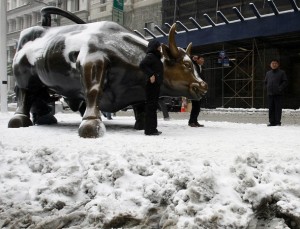Dow at Lowest Level Since Clinton Administration
 The economy hasn’t been this bad since the last time we had a Democrat in the White House.
The economy hasn’t been this bad since the last time we had a Democrat in the White House.
Stocks are down sharply today and the Dow Jones industrial average fell below 7,000 for the first time since 1997 on signs of further turmoil among financial firms and a downbeat report from investment guru Warren Buffett.
I’m being mostly tongue-in-cheek, of course. But the post hoc ergo propter hoc game has been so popular over the last eight years that turning the tables has some therapeutic value.
Beyond that, it’s actually quite interesting that, despite what is uniformly considered the worst economic downtown in decades, including a collapse in the banking, insurance, housing, and automotive sectors, the Dow is just now falling to where it was during what’s uniformly considered “the Clinton boom. ”
And, yet, it’s half where it was in October 2007 during the administration of The Worst President Evuh.
Is the Dow just no longer a very good indicator of the economy?
Photo from Reuters Pictures.






The dow is better at predicting the future economy than reflecting the current economy. Given that Obama’s one year deficit is greater than all four years of Bush’s first or second term, the Dow may be a bit optimistic.
I’m no economist, but it would seem to me that the data the Dow provided in 1997 is not really applicable today.
Also, it is often overstated as an indication of economic health. It’s just one indicator among many. They work best cumulatively rather than as a single measure.
Of course, all indications look rather bleak, so in this case…
…it seems like the Dow works just fine as an indicator.
I think the Dow reflect confidence more than anything, and I think right now nobody has any confidence in anything-most people are in the “cross my fingers and hope the guy is right” mode of thinking.
I know looking at my kids’ college funds right now is extremely painful, considering they are actually less at this point than what was originally put into them about 10 years ago. I am looking at the first one going off to college in two years, and whats in that account isn’t likely to get her very far, and I am not even sure it is wise in the current economy to encourage anyone to take on 60k plus of college loans at the moment.
I think there are two economies, the financial economy and the real one. The financial economy is considerably larger than the real economy and only loosely related to it. The stock market is a good indicator of the financial economy.
Excuse me? I don’t think you turned the tables so much as turned the irony up to 11. (And then found the little irony knob on the irony know, so you could turn that up 11 in a recursion.)
Dave, my buddy entertained the owners of some auto dealerships last week. They said that they used to green-light loans on the spot, now they have to send good credit scores “6 or 7 places” to see if they could find a loan.
The idea that “the financial economy is considerably larger than the real economy and only loosely related to it” died 3rd quarter, 2008.
I think that the financial economy is still larger than the real one, if only by a little. That’s why housing prices and the stock market, both more tightly moored to the financial economy than the real one for many years, are both going down.
If you are referring to the giant global pool of money, yes it was (is) there, and has driven financial innovation in strange ways.
We are in the midst of a Great Deleveraging coming off that cycle (as I’ve said), and I don’t fault G.W. Bush for inventing it (he didn’t), but only for taking the least responsible set of actions possible in its face.
They held interest rates too low for two long, and then as investors fled to “innovative” instruments, they reduced oversight on the process. It was like greasing the skids.
It’s almost as if the number at any given point in time is irrelevant, and only the trends really matter.